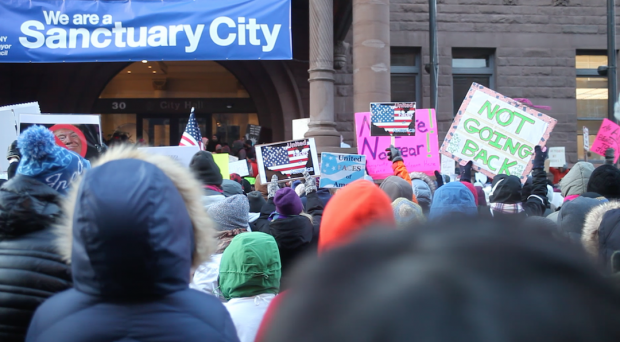Use Wind Storm to Empathize with Refugees
Primary tabs
Submitted by George Payne on Mon, 2017-03-13 11:50
The philosopher William James once wrote: “Great emergencies and crises show us how much greater our vital resources are than we had supposed.”
After wind gusts surpassed 80 mph on March 8th, downing trees and telephone lines, about 120,000 people in the Rochester area were left without power. Monroe County was the hardest hit county in western New York with concentrations of severe damage in the suburbs of Greece and Irondequoit. In the storm’s aftermath, people were forced to stay with friends and family, or find sanctuary in rec centers, hospitals, churches, and motels. It was one of the worst natural disasters to impact the region in 30 years.
At the risk of politicizing a tragedy, I think James’ observation is made even more salient when one considers the consequences of President Trump’s revamped travel ban. Greece, NY, the hardest hit community in our area, voted for Trump in November. 40.3% of Monroe County (128,871 voters) went to the polls for Trump. Will Trump supporters view this storm as an opportunity to walk a mile in the shoes of the refugees banned by the president’s order? Obviously the two disasters are unique, but the experience of being stripped of basic amenities such as hot water, heat, and in some cases one’s home are similar enough to pave common ground towards mutual awareness and understanding.
Will Trump supporters in Monroe County come away from this unfortunate event with an increased capacity for empathy towards those who Trump has turned away? What if the local motels said no room here? What if the hospitals and community centers said go away? What if Sam’s Club or Home Depot refused to sell generators? That is the feeling of being turned away at the border or airport for no reason.
Needless to say, care should not begin in the ER. It should not take a natural disaster to awaken people to the realization that refugees are not fleeing the safety and comfort of their homes by choice. It should not take a natural disaster at home to make people in western New York realize that we are all at the mercy of forces beyond our control. But sometimes it does.
If a newfound sense of compassion for others is stimulated because of this storm, that is a very good outcome. Ultimately my hope is that people will come away from these kind of trials not only with a deeper sense of compassion for their own well being, but with a deeper resolve to help those who are less fortunate than themselves-and not only within their own families and neighborhoods, but for all refugees anywhere in the world.
The author George Cassidy Payne is Founder of Gandhi Earth Keepers International and a Humanities Instructor at SUNY FLCC.










